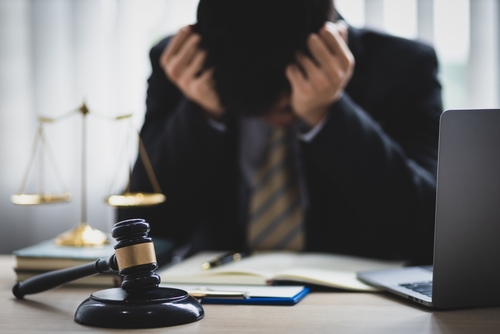Law schools employ texting service to keep tabs on students' mental health

Image from Shutterstock.
With growing numbers of law students facing mental health challenges, at least five law schools are using a service to proactively identify struggling students and intervene as soon as possible.
The law schools at Pepperdine University, Roger Williams University, Wayne State University, the University of Maryland, and the University of Detroit Mercy are experimenting with Early Alert, a service that texts students weekly and asks them to rate from 1 to 10 about how they feel regarding topics including academics, sleep quality and financial concerns, according to Reuters and the JDJournal.
Students answering in the mid to low range are sent a list of resources, contacted by a law school staff member, called by a crisis counselor or all the above.
The service was originally designed for medical students. Now, the law schools are among the 35 institutions using the service. Schools pay about $5,000 annually for the opt-in service, according to Reuters.
In a 2021 survey of law students at 39 schools, published in the University of Louisville Law Review, nearly 69% said they needed help for emotional or mental health problems in the past year. In 2014, the same survey found that 42% needed support.
 ABA Journal Legal Affairs Writer Julianne Hill tried a demo of the text service Early Alert, which texts students weekly and asks them to rate from 1 to 10 about how they feel regarding topics including academics, sleep quality and financial concerns.
ABA Journal Legal Affairs Writer Julianne Hill tried a demo of the text service Early Alert, which texts students weekly and asks them to rate from 1 to 10 about how they feel regarding topics including academics, sleep quality and financial concerns.
After graduation, the struggles continue. Lawyers are twice as likely as other adults to have suicidal ideation, according to a study published in February in the journal Healthcare. High stress, overwork and loneliness contribute to the mental health challenges facing the legal profession.
In a demo of Early Alert with the ABA Journal, the sample texted question was: “How satisfied are you in your life over the past week, on a scale of 1-10?”
Answering with “2” prompted one text with information about calling 911 or 988, the Suicide & Crisis Lifeline, and another asking to share “what’s going on?” After a response asking for support, numbers for counseling services and peer support team and a link to self-help resources were sent, along with a promise of “check in soon.”
School administrators cannot see the student’s responses, but answers with ratings of 0 to 3 send an alert, Chalak Richards, dean of students, diversity and belonging at the Pepperdine University Caruso School of Law, told Reuters. She said she calls or emails to offer support.
“Every single student I’ve reached out to has been exceptionally grateful for the contact and has said they did not think anyone even knew they were going through something,” she said.
Sidebar
• Directory of Lawyer Assistance Programs
• ABA Commission on Lawyer Assistance Programs
• The Well-Being Toolkit for Lawyers and Legal Employers is at ABAJournal.com/toolkit.
• The Suicide & Crisis Lifeline is 988.



